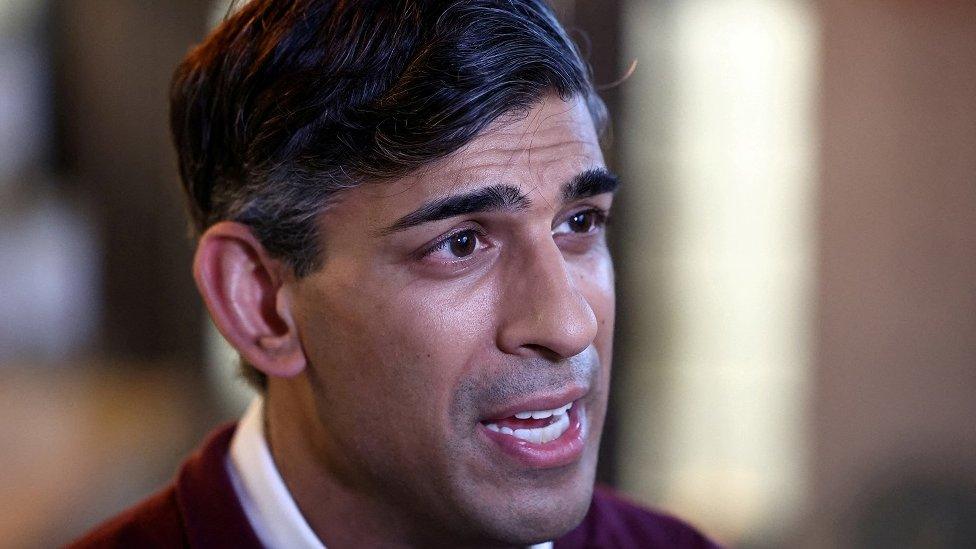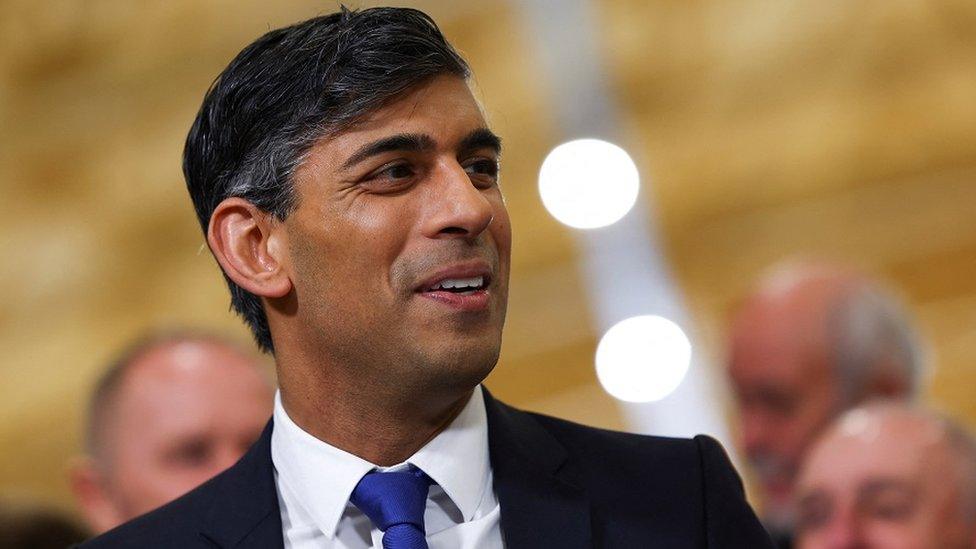Rishi Sunak to warn next few years 'most dangerous' for UK in major speech
- Published

Rishi Sunak will say the UK "stands at a crossroads" ahead of "some of the most dangerous years", in a pre-election pitch to voters on Monday.
In a speech, the prime minister will argue his "bold ideas" can "create a more secure future" for Britons.
It will be his biggest intervention since the Conservatives' bleak showing in the local elections.
Labour said the Tories cannot fix the UK's problems as "they are the problem".
Mr Sunak's speech in London will focus on security and broad challenges facing the UK, as he argues voters face a stark choice in who will lead the country.
He will say: "I feel a profound sense of urgency because more will change in the next five years than in the last 30.
"I'm convinced that the next few years will be some of the most dangerous yet most transformational our country has ever known."
The prime minister is also expected to talk about foreign policy, describing China, Russia, North Korea and Iran as an axis of authoritarian states who threaten the UK; global immigration and artificial intelligence.
National polling puts Labour as much as 20 points ahead of the Conservatives in general election voting intentions.
The Tories also lost 470 councillors in the local elections, as well as the key mayoral race in the West Midlands.
The prime minister is seeking to portray himself as the best person to deal with the challenges after the general election - expected before the end of the year.
He will say he has "bold ideas" that can "create a more secure future" for Britons and restore their "confidence and pride in our country".
"I feel a profound sense of urgency because more will change in the next five years than in the last 30," he said.
Mr Sunak will vow to safeguard the UK against threats of war, a global rise in immigration and "those seeking to undermine our shared values and identities".
And he will pledge to capitalise on opportunities presented by technologies such as artificial intelligence.
He will say: "Over the next few years, from our democracy to our economy to our society - to the hardest questions of war and peace - almost every aspect of our lives is going to change.
"How we act in the face of these changes - not only to keep people safe and secure but to realise the opportunities too - will determine whether or not Britain will succeed in the years to come.
"And this is the choice facing the country."
Downing Street has argued Mr Sunak has a track record of delivering bold solutions, from furlough during the pandemic to the Rwanda scheme - which was first launched by Boris Johnson's administration.
The prime minister has sought to convince voters that Britain's economic prospects are improving in a bid to reverse the Tories' electoral fortunes.
Labour mayors
Meanwhile Sir Keir Starmer will meet Labour mayors later - and will portray the choice as being between "a changed Labour Party… or more chaos and decline under the Tories".
He will hold roundtable talks with the mayors about improving regional growth if Labour wins power.
Sir Keir is expected to tell them: "Be in no doubt that this is the key choice at the next election: a changed Labour Party that will raise living standards for everyone, everywhere or more chaos and decline under the Tories who will never be able to match the ambition of this country.
"We saw the public turning to Labour last week as a first step to getting the change Britain needs. And voting Labour is the only way to end the chaos, turn the page and start to renew all our communities."
Foreign Secretary Lord David Cameron on Sunday argued it would be "absolutely right" for the general election to be held in the second half of the year to give voters time to see "the economic plan is working".
Official figures last week showed the economy grew by 0.6% over the first quarter, ending a technical recession recorded in the final half of last year.
But Mr Sunak has faced repeated setbacks - including the recent local election results. His woes deepened with the defection of Natalie Elphicke in protest against his record on housing and stopping small boat Channel crossings - the second MP to desert the Tories for Labour in as many weeks.
Related topics
- Published13 May 2024
- Published6 May 2024
